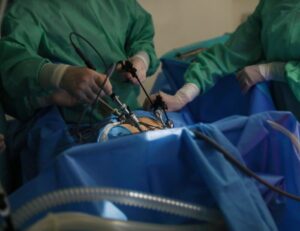Egg freezing is one potential solution for some women, especially those with a cancer diagnosis (or another diagnosis that threatens fertility) or those who aren’t ready to become mothers before their biological clock starts winding down. Fertility declines as we age, often taking a nosedive after 35. Yet, year after year, the average age of the first conception is pushed back so it makes sense egg freezing has seen a massive increase in popularity. Just from 2019 to 2020, egg freezing has seen a 23% increase.
Let’s go over some of the basics of freezing your eggs.
What is egg freezing?
Egg freezing is a fertility treatment that does exactly what it sounds like. A woman’s eggs are collected from her ovaries and frozen to be thawed at a later date. Ideally, the eggs are removed and preserved at the peak of a woman’s fertility (before 35 for most women) and saved so they can be fertilized and transferred to her womb or that of a surrogate via IVF at a later date.
What is the egg freezing process like?
The process is physically demanding and expensive. The success rates are affected by how long the eggs are stored, the age of the woman, and the quality and number of eggs retrieved. There aren’t any guarantees. The best candidates are young women who have received a cancer diagnosis or another diagnosis that threatens their fertility, whether that’s by the nature of the disease itself or a symptom of the treatment they’ll need to undertake.
A doctor or fertility specialist will determine if you are a candidate for egg freezing. Next, you’ll undergo a series of tests: blood tests to check hormone levels, tests to check for infectious diseases, and ovary scans. After the testing, the egg harvesting process begins. Medication is used to control ovulation and stimulate egg production.
You can expect 10-14 days of hormone self-administered injections (up to three times a day). This is a big commitment as your injections have to be administered at the same time each day. You’ll also have to visit your clinic regularly to see how you’re responding to the medication.
After the injections, the eggs will be retrieved. You’ll be placed under general anesthesia or conscious sedation with pain relief. The process lasts about 20-30 minutes and the eggs are collected via the vagina. Usually around 15 eggs are collected, coated with a freezing solution, and frozen. The eggs are stored until you’re ready to have them thawed. The eggs that survive the process can then be injected and fertilized by your partner or donor’s sperm.
What are the cons to egg freezing?
- Intense process
- Physically demanding
- Expensive
- Candidacy is dependent on many factors
- Success rates vary (According to the HFEA, only 18% of patients using their own frozen eggs in IVF treatment have a baby)
- Fresh eggs have a higher success rate than frozen eggs
- Not all the eggs you freeze will be viable
- There can be side effects (Talk to your doctor about what you could expect)
If you’re considering egg freezing, speak with your gynecologist or fertility specialist to see if it’s an option for you. Egg freezing is not something to take on lightly. It’s a huge commitment and expense. Not only do you pay for egg retrieval, you also have to pay for egg storage. Only you and your doctor can determine if egg freezing is the right choice for you. Do you have more questions about egg freezing or other fertility treatments?
Call WomanCare at (847) 221-4400 to schedule an appointment.








